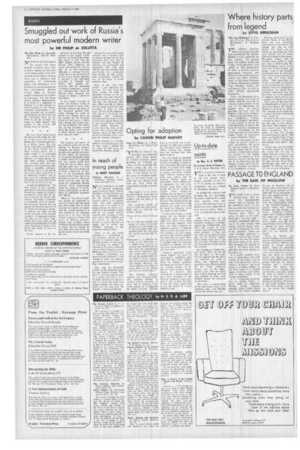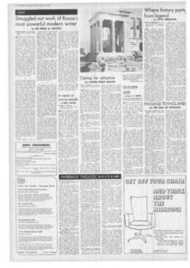Page 6, 7th February 1969
Page 6

Report an error
Noticed an error on this page?If you've noticed an error in this article please click here to report it.
Tags
Share
Related articles
A Cold Warrior Driven By Faith, Not Ideology
Christianity Salvaged In The Gulag
Eight Youthful Martyrs In Red Square
Marxist Science
Vatican Anxiety About The Peace
Smuggled out work of Russia's most powerful modern writer
by SIR PHILIP de ZULU ETA
The First Circle, by Alexander Solzhenitsyn Marvin Press 42s.)
NO-ONE in the West knows
for certain how many political prisoners there were in Russia during the last years of the Stalin regime; there were certainly many millions. Among them was a relatively high proportion of professional people and intellectuals. It is therefore not surprising that the best contemporary Russian writing seems to Western readers obsessed by the shadow of Kazagstan. For the Soviet citizen political imprisonment is as much of a nightmare as inflation is to the German or unemployment to the Briton. Alexander Solzhenitsyn is the most powerful and perceptive contemporary Soviet writer and the impression made by his work is all the stronger because he deals mainly with aspects of this subject still largely taboo in Russia.
His first novel, published in the West in 1962 under the title of "A day in the Life of Ivan Denisovich," showed conditions in a labour camp. His new work, apparently smuggled out of the Soviet Union, has a more fanciful theme and a wider scope. It is concerned with a prison laboratory near Moscow in which during the late 1940's political prisoners with scientific skills were employed to develop among other things a scrambler telephone for Stalin's use. It is not certain that such a place existed but it is inherently possible and in any event the concept enables the author to range widely over Soviet life twenty years ago.
It must be admitted that "the First Circle" is not a particularly good novel; the characters themselves engage the reader's compassion more than his interest and are not totally convincing. The book is however a remarkable piece of observant reporting inspired but not greatly distorted by deep hatred for Stalin and his use of terror. It explores the effect of this system not only on the political prisoners, its apparent victims, but also on the official hierarchy who were and are its ostensible beneficiaries. It is the most illuminating hook about Soviet life which we have so far seen.
Russia appears in the ex
periences of Spiridon, the onl peasant in the prison world, who has survived all the appalling stages of civil war, the NEP, Stalin's purges and the Second War; engulfed by events and forces too big for him, he is still uncrushed although, or perhaps because, all he loves is the land and all he has is his family. Koestler is recalled in the dialectical squabbles of Sologdin and Rubin, both unjustly imprisoned and yet remaining convinced communists arguing and justifying their views by Marxist logic chopped fine enough to delight a medieval schoolman.
In the random brutality of prison life Kafka's world of fantasy is never far away. Solzhenitsyn recounts the story of the disgraced general who, whilst darning his socks in prison one Sunday, hears on the wireless that he has been promoted and given a Stalin Prize. Where else could it happen but in Russia? And where else are the prisoners moved about the streets of the capital in Black Marias disguised as meat delivery vans?
The tragedy and horror of the political prison and of the millions of Russian political prisoners, the misery of their families, the anguish and terror of their jailers, the hypocrisy of the general population make a sombre theme. It is amazing that the system could have lasted for nearly thirty years and that even now it is only moribund. The roots of the evil go back a long way: to Tartary, to the increasingly mild tyranny of the Tsars and to the brutality of civil war. Above all blame must lie with the distorted but compelling Marxist doctrine which unswervingly exalts the primacy of revolutionary development at the expense of individual happiness and dignity.
When in "The First Circle" two people are suspected of an act of which only one could have been guilty they are both arrested as a matter of course. And the untried prisoner is at once treated in the Lubianka prison as if he were already serving a sentence. Even in the centre of Moscow prisoners behind high wooden fences build flats for the official classes to enjoy and the passers by turn their eyes away from the guard towers round the building site. Y Closed box cars with barred windows arc a familiar sight at railway stations but the free passengers look away. And in ordinary life the families of prisoners are persecuted and ostracised. The well paid officials and their families lead comfortable and complacent lives amidst all this horror, only occasionally racked by fear of the finger of terror touching them.
With all this "The First Circle" is not uniformly depressing. For one thing the Soviet system was never so efficiently ruthless as for example the Nazi one. The laws may be unjust but to some extent they are observed. Men may wither and die in Siberia but the death penalty has been abolished at least in most cases. Above all the indestructible will of a few heroic men
triumphs; the intellectual Gerasimovieh fearlessly refuses to work on a spying device and so save himself from a labour camp. Ruska Doronin, at twenty three the baby of the prison with a twenty five year sentence ahead of him, nevertheless successfully plots to expose the prisoner informers.
Their fortitude is a moving tribute to the human spirit and, we may hope, a portent for the future of that great, unpredictable Russian people.
blog comments powered by Disqus











